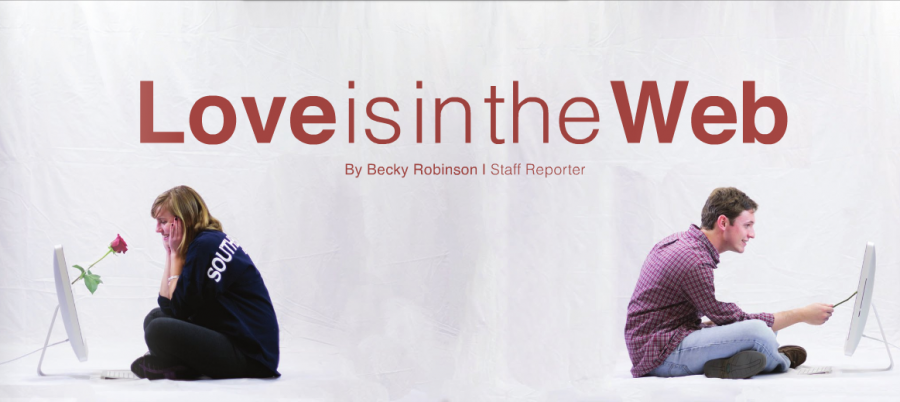Like many other college students, Charlotte Lawson is in a long-distance relationship. However, she didn’t meet her boyfriend in high school or at a bar. Lawson met him online.
Lawson, a senior majoring in criminal justice and political science, met her boyfriend of nearly a year through an online Alabama football forum he moderated.
“We just sort of incidentally connected on Twitter,” Lawson said. “I thought, ‘Hey these guys write for this site, and I want to follow them on Twitter and get updates instantly,’ and he followed me back.”
Lawson said she and her boyfriend soon found out they shared many common interests, especially music and art. The two planned to meet at a Tuscaloosa bar for the A-Day game last April.
“I didn’t go in with any romantic expectations,” Lawson said. “I was just like, ‘Here’s a friend. If we don’t get along I can go home, block him and never talk to him again.’”
That sense of control of her situation made Lawson feel secure, knowing that if things went badly she could delete him from her life with a click of her mouse. She said it was intimidating, though, and she didn’t know what to expect.
Fortunately for Lawson, the meeting inspired by her Twitter activity led to a serious relationship.
The pursuit of relationships online has become a hot topic. Everyone read about the scandal surrounding Notre Dame’s Heisman candidate Manti Te’o and MTV’s hit show, “Catfish,” dedicated to helping online lovers meet in person, often with shocking consequences.
What was once seen as a tool for older, working people who were too busy for the bar scene to connect through sites like match.com and eHarmony.com has evolved, and online dating and social media sites like Facebook and Twitter are now becoming a means for younger audiences to meet.
Meredith Cummings, the director of the Alabama Scholastic Press Association, said online dating has evolved drastically since the birth of the Internet in the mid-1980s.
“I remember when meeting someone online was this cool new thing you could do,” Cummings said. “We didn’t have social media. We had chat rooms. Now you can meet somebody with 140 characters.”
Cummings said online dating is beginning to become a whole new outlet for people, including college students, to meet. Whole businesses are being created that center around connecting on the Internet.
“We’re all getting so used to instant gratification [with technology], and it’s the same thing with dating,” Cummings said.
“We don’t have to wait and call somebody and sit around and ring our hands and wait for them to call us back and agonize over it. We want to be able to get online and say, ‘Hey, you want to go out?’ and two seconds later have a date.”
Although Cummings said she does not see a day where there will be dating sites geared toward college students, she said apps are a possibility.
One app, Tinder, has already become popular with some students. The app allows people who are already near each other to connect through chat rooms.
Lee Keyes, the executive director of the UA Counseling Center, said online dating could be a helpful tool for shy people when used correctly.
“For people who have a lot of anxiety about meeting others, it can be a way of introducing themselves and having things known about them before they have a face-to-face encounter,” Keyes said.
However, Keyes stressed the importance of maintaining the ability to build personal relationships and cautioned against the pitfalls of online dating.
“You don’t start out with a wide-open book on your life. You start with a pretty fundamental profile, and you allow people you’ve established contact with to earn your trust over time,” Keyes said. “[Online dating] should never replace human contact. That would be one of the unwise uses of that medium.”
Keyes said the Counseling Center has seen cases of online dating that have caused trauma in students, whether physical or mental. He also said there were successes in the online dating field and that the results of online dating could be thought of as a wide spectrum.
Like Keyes, Cummings said students should remain guarded and skeptical when dealing with online relationships, even though doing so gives the relationship “a weird starting point of not being very open.”
She said she trusts Facebook and Twitter more than online dating sites because most dating services do not require much registration or verification of a person’s identity.
The University has services that can help students use online social media safely, even if they are not looking for love. The Office of Technology has a web page students can visit for tips, as does the Counseling Center.
Even with the backlash seen in some cases, online dating is likely here to stay.
“It’s becoming more and more normal,” Lawson said. “I would say there’s no harm in pursuing friendships, but I could caution against getting your heart set on romantic relationships, lest you end up like Manti Te’o.”
Leading in today’s Crimson White:
Tutoring center offers free academic assistance
University planning series to commemorate desegregation anniversary









